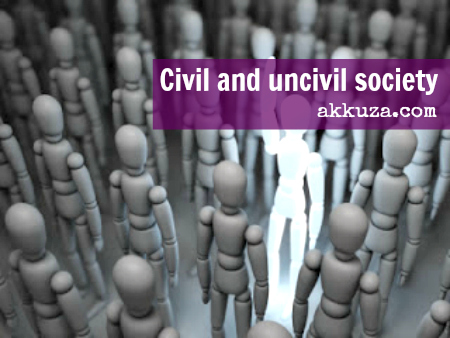The Muslim Brotherhood will be turning out in large numbers in Cairo on Sunday to protest the abrupt removal of what was after all a democratically elected government. The Maltese hapless clone of the British National Party will also be demonstrating in Valletta – voicing their support for what they interpret as the Prime Minister’s strong stand against Europe and in favour of the ill-fated push-back policy. These too are manifestations of civil society. The right to express one’s opinion is sacrosanct, there’s no two ways about that, and even the most abominable of ideas can be voiced – to a certain extent (let’s not forget it is not legal to incite people to commit violence or to be violent).
The freedom of expression is a victim of gross misinterpretation in Malta though – as has often been documented in this blog. All too often the right to have an opinion is confused with “being right”. Having an opinion, no matter how maladroitly it has been constructed, seems to be the one and only “right” that counts. Critics of opinions are themselves labelled as “intolerant” and it all goes rather awry when the subject is tolerance itself – as in the case of immigration. Muscat’s Labour has built a lot of mileage on the concept of “the right to have an opinion no matter how wrong” and continues to fan this twisted logic while in government.
I am not sure how pleased Muscat can be with the Sunday demonstration in his honour. He must have failed to calculate the long-term effects of his clumsy bluff. Demonstrators will be hitting the streets in Malta on Sunday practically clamouring for the PM to insist on flaunting international rules and fundamental human rights. Our modern progressive Prime Minister must not have seen that coming. Diplomatic and strategic short-sightedness is a clear trait of the Taghna Lkoll arsenal – and many seem to be finding that out now.
Which brings me to the rest of civil society. We have seen in the past few days a sort of sectorial backlash to Muscat’s proposed push-back policy (or bluff). First the lawyers, then the academics and now the authors were reported as taking a unified stand against the whole idea. To begin with there is nothing more reassuring than seeing sectors of civil society putting their money where their mouth is. I do sense though that the obsession with partisan division still sticks like a limpet with the majority of such initiatives.
It’s not a question of being a wet-blanket but if I set aside the authors’ declaration I look at the “academics” and “lawyers” joint positions and all I see is a smokescreen for a party stunt. The most blatant of the two was the 65 lawyer judicial protest. Aside from the fact that in certain quarters suddenly lawyers became a force to be reckoned with the names on the list were not exactly an across the board petition gathered at one of the drink-holes where lawyers tend to agglomerate. “65 lawyers active directly or indirectly with the nationalist party” would have been a better label.
As for the academics and as Maltatoday put it “labour intellectuals” there was again a selective exercise going on. That common position was not circulated at the University Canteen for anyone who agrees to voluntarily append his signature. It was an exercise in “look our party allows dissidence” – which really rang foul when you put it in the perspective of the “elaborate bluff”. Why? Because if you were Joseph Muscat and you really had hoped that your bluff were called you would also need a way to distance your party and its credentials from what you knew deep down to be a nefarious position. What better way than have your token liberals and academics yell their disapproval?
The strongest messages came from an all too different milieu. Those NGOs who quit the LGBT forum clearly explaining to the hapless government that you cannot pick and mix in the world of fundamental rights. A government that has no qualms to send human beings to their doom (and separating families in the process) cannot be serious about other fundamental rights. Aditus and Drachma did the only possible thing and quit the forum. You cannot engage with a bluffer and with a government that uses rights pragmatically for vote-gathering purposes.
To conclude, the minefield of immigration policy cannot be “un-politicised”. It is as political as it can get. The discerning citizen must be able to distinguish between the genuine movements and the smokescreens set up by the parties to cover what has hitherto been a hopeless record in the field of immigration. In the post 9/11 world we have to come to terms with this realignment of civil society and bear these truths in mind while taking an active role.
Unfortunately, the genuine movements (for or against certain policies) operate in the same field as the political parties who have a strong grasp on the ultimate decision taking seats of power. The end result of such a concoction is as unpredictable as we can allow it to be.
If there is anyone who should stand up and be counted then it is that part of civil society that harbours values for values’ sake and stops thinking in the “us and them” dichotomy. It will be hard. Judging by the history of Maltese politics…. it will be nigh impossible.

